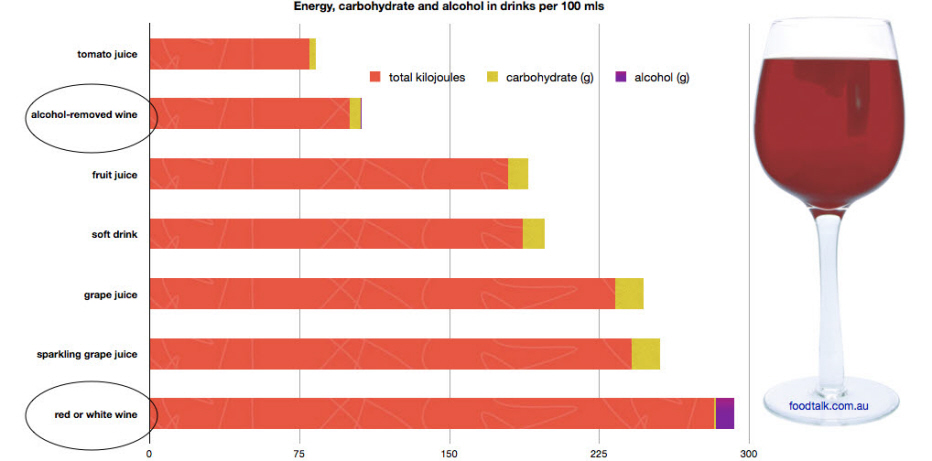Alcohol-free wine
‘Alcohol-free’ wine: alcohol-removed wines reviewed
What do you think about alcohol-free wine from the supermarket? Any good? I’ve been doing Dry July and have got a real taste for it."
A reader posed this question to me while she was doing Dry July. She'd taken a fancy to de-alcoholised wine.
Inspired by the question and her fancy for non-alcoholic wine, I decided to clear my distant memories of limp flavoured grape drinks and explore them once again.
To my surprise, I easily found more than 20 varieties of de-alcoholised (gosh that word is cumbersome) available online, at bottleshops, and in supermarkets.
A certain hint that their flavour and acceptance have come a long way since I cracked open the last bottle!
What did I find out when I reviewed more than 20 varieties of alcohol-removed wines?
This is my summary.
Alcohol-removed wine is also called de-alcoholised wine. It is available from bottle shops and supermarkets.
Alcohol-removed wine may have grape juice or grape juice concentrate added back in after alcohol removal to enhance taste and body of the drink.
Alcohol-removed wine is not the same as sparkling grape juice, which is commonly marketed as alcohol-free grape juice and bottled to look like a sparkling wine.
The amount or alcohol present in alcohol-removed wines is very small, less than 0.5% alcohol by volume.
When the alcohol is removed from wine, is the wine 'better for you'?
On average, alcohol-removed wine has less than half the kilojoules/calories (kJs/cals) of wine. It’s good to know you could drink the same volume as you do now and slash the kJs from drinks in half.
On average, alcohol-removed wine has less than half the sugar and less than half the kilojoules/calories (kJs/cals) of sparkling and still grape juice.
To manage your weight and fructose intake you are better off with alcohol-removed wine than sparkling and still grape juice.
Alcohol-removed wines are not low cal and kJ-free but they are certainly a better social drink than soft drinks, grape juice and fruit juices. Water, plain soda water, plain mineral water and tomato juice are even better choices.

Have you ever had reflux? High blood pressure? You may benefit from a switch to alcohol-removed wine.
Alcohol triggers reflux and is not recommended. It can worsen the reflux.
Excess alcohol can raise blood pressure levels further.
Take prescribed medications? Caution with alcohol is recommended for many common medications.
Alcohol interacts badly with some medications. Check online or with your pharmacist to about medications you take.
For example, zero alcohol is recommended if you take the weight loss medication duromine. Alcohol and blood pressure medications don’t always sit well together. Anti-depressants, anti-anxiety preparations, sedatives and sleepers, travel sickness preparations, blood pressure medications, cough and cold medicine and painkillers are amongst the other common alcohol-clashing medications.
De-alcoholised wine provides a social drinking option when medications and alcohol clash.
Have you been told you have a fatty liver (or NAFLD, NASH)? It is best to avoid all alcohol. It is also best to avoid sparkling and still grape juices, soft drinks and fruit juice.
Research shows that both alcohol and excess fructose increase fat levels in the liver. Grapes have a high fructose content (50% of the carb content is fructose). A fatty liver is an unhealthy liver. Removal of both alcohol and fructose helps reverse the damage.
Check alcohol-removed wines for the presence of grape juice concentrate, which is sometimes added back to improve flavour and body of the wine. If grape juice concentrate is present, you may need to limit your daily intake of de-alcoholised wine to less than a couple of glasses.
Pregnant, trying to get pregnant or breastfeeding? It is safest not to drink any alcohol.
A switch to alcohol-removed or alcohol-free drinks is a smart social celebration choice. Pregnancy is the time to focus on brilliant nutrition for mum and bub, without alcohol.
Heavy drinker? If you tend to give wine a fair nudge, decide to switch to alcohol-removed wines after you’ve reached your daily alcohol limit. The limit is up to 1 standard drink for women and 2 for men (read more about the limits here).
If you have diabetes, the decision is less clear because of the sugar content in alcohol-removed wine. You will need to account for the extra carbs. Regular wine has a much lower sugar content than de-alcoholised wines. On the flip side, alcohol interacts with metformin to cause skin flushes in sensitive people. Excess alcohol can cause risky overnight hypos for those using insulin injections.
For your interest
I have no connection with companies that would benefit from this review. I have not received funding or product samples from beverage companies (alcohol, de-alcohol, alcohol-free, soft drink, juice or water). This review and interpretation is impartial based on research and data collection by me, Trudy Williams, dietitian and nutritionist.
The information here is of a general nature. As always, I recommend you speak with your own health professionals about which approach is best for you.
